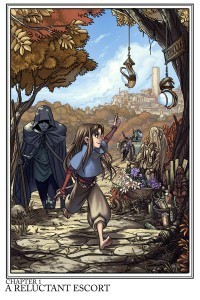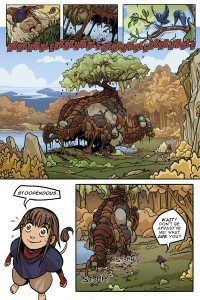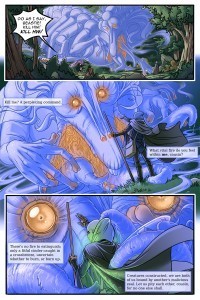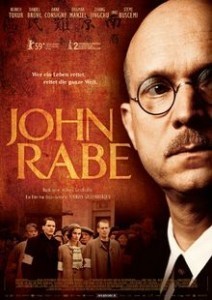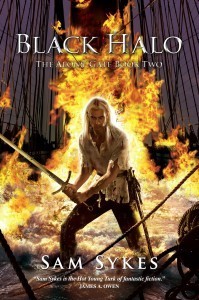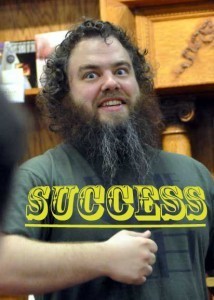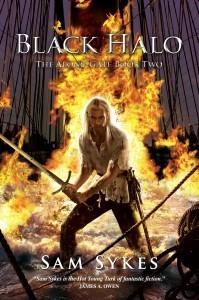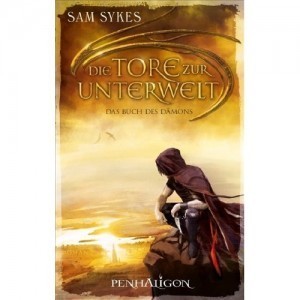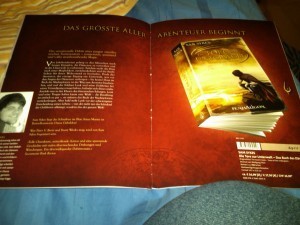Sam Sykes's Blog, page 22
February 13, 2011
Unsounded: Characters, Pacing and Building with Ashley Cope
Did you read Ashley Cope's Unsounded, like I asked you to?
If you did, you'll have doubtlessly found what I did when the goons brought it to my attention: a magical world wrought with wonder and mysticism that builds without overbearing, an incredibly deep relationship between two misfits that both repulses and attracts, an undercurrent of danger and depravity that courses through the entire story, expertly paced.
If you didn't, then I hate you.
But, I digress…
Unsounded follows the adventures of Sette, a feral, foul-mouthed child thief, as she is escorted through the land by her unwilling companion, the Galit Duane: spellwright, good Aldishman, zombie. It's also a comic I marvel at for its ability to get just about everything right. A light read-through will reveal Ashley Cope's distinct talent for fantasy writing: likable characters, magic that is actually wondrous and societies as bizarre as the creatures that live in the wildernesses alongside them. But a deeper look will reveal that this comic has an amazing grasp on craft: pacing, worldbuilding, exposition and character relationships are handled with much more finesse than you would expect from your average comic.
Ms. Cope agreed, at my whining plea, to talk about this craft with me. I hope you enjoy what I had to ask and what she had to say.
So, it's essentially mandated that any fantasy debate at least include the topics of world building and magic systems. I've often thought of them as largely hazardous concepts when people focus exclusively on them and neglect aspects like character and conflict, but one of the things I really enjoy about Unsounded is that the magic and the world's details are expertly paced. We get a glimpse into a magical world filled with wonder and its societies as they pertain to the story.
How much of that is deliberate and how much of it is whimsy? By that, I mean, are these societies and details mapped out and deliberately seeded throughout the story? Or is it sort of a case of "wouldn't it be cool if we had a giant walking tree monster…how can I put that in?" What do you prefer working with?
Balancing world information with narrative is one of the most difficult things about working in fantasy, and I'll hurl that challenge at any author who scoffs at the genre. It's particularly difficult in comics. A fantasy novel can dump paragraph upon paragraph of setting information, and detail even complex systems pretty thoroughly right off. A comic is limited, essentially, to character dialogue; character dialog that eats up precious page space and which has to be used with great discerning and economy.
For that reason, all of the setting details and where they are revealed in Unsounded are very deliberately mapped out. I could fill up a wiki with the amount of information I've developed for the comic's world but I've tried very hard to keep unimportant details off the page so far. Editing out irrelevant details is what I actually have the most problems with. Some details, however, serve a character-building or thematic role on occasion. The wandering root was not only a fun and unexpected monster – its empathic nature allowed it to serve as a visual manifestation of Duane and Sette's relationship. Perhaps it's foreboding that Duane had to violently put it down. The shrines and statues of gods seen on occasion are often pictured where the actual interference of gods to protect innocents would be expected – but that interference doesn't come. The giant dogs represent the defeat of leisure and fealty by the capitalist demands of poorly compensated labour– haha, no, that's a lie. Who doesn't like giant dogs?
Speaking of pacing, we should probably address just how well Unsounded accomplishes this. It has a real flair for blending the details of the world in with the characters' own stories and keeping up the suspense. Nothing really feels like you're doing things just to do them.
I suppose it relates back to the question of planning versus growing, save that it's a question of how much do you reveal about each character and the world and in what order? Are there some characters that require a lot of fleshing out and exposition? Or are you comfortable leaving the reader to make their own assumptions?
Thank you! Pacing is really difficult for anyone but in webcomics, I believe how you post the pages can be just as important as what's on the pages. If you have five pages that flow together and depict one important action or one slowly shifting tone or mood, you MUST post those pages together. Be a professional, care about your story, plan ahead, and get those pages done so that you can post them in a way that benefits your pacing. So many great scenes in so many webcomics have been diminished because of a poorly thought-out posting schedule. Dramatic webcomics must overcome this strict one-page-at-a-time hurdle and the even worse post-when-you-feel-like-it hurdle.
That mini-rant aside, I believe that fleshing out a character can be done with real brevity if you do plan and trust your readers to squint between the lines. Sette, for instance, is intolerable. I don't expect anyone to like her much, but I've painted the whole of her background already for anyone who cares to look. I didn't do this by giving her a tear-ridden soliloquy – just explained the rough logistics of her background, who her dad is, and showed a few flashes of what life may be like for her back home. Her personality itself and how she treats people hopefully hammers home what's always been expected of her and how she's been raised. She's not an obnoxious imp because I think that's cute and endearing. In giving her so much page time I have to ask for a lot of trust from the reader. She's been a risky character from page one.
Epic fantasy is always difficult to pace. Most authors seem to find the solution in starting off small. Everyone knows the Hero's Journey model. It's a little played out though, isn't it? Maybe the protagonists shouldn't be heroes. Maybe the story should start with the characters already in the middle of a journey. I won't always succeed with what I do but I hope I always at least crash and burn in interesting ways.
Another tremendous aspect of Unsounded are the changes of tone that so well serve to reveal aspects of the world and characters that aren't apparent or wouldn't be talked about in natural conversation (Duane's communion with the summoned beast comes to mind). The changes in tone really bring about another mood to the scenes before us, ramping up tension and turning it into horror.
A lot of this is accomplished by the sudden changes in artistic style, of course, but what do you do in terms of writing? In the previous example, we go further into Duane's head than we ever have. Is it all an opportunity to delve further into the characters' minds? Do you have any questions you ask yourself or techniques you practice to reach the mood you want to?
Generally when it comes to mood I try to keep my themes in mind, and I try to always interpret the visuals and the narrative through the lens of the currently pertinent character. For instance, most of the first chapter is a manic, cartoony and exaggerated romp. It's Sette's chapter. It only turns more morose when Duane's rattled by what he finds inside the tree monster, and later when Sette's hurt. Chapter 2, after the gloomy opening scene, is still under Sette's thrall up until the scene you mentioned, when Duane is struck by his own similarity to the summoned beast and forcefully commandeers the mood and the narrative for a few pages. I let the art and his dialog reflect this. Again it asks for trust from the reader because it's a shift towards the angsty, and pretty different from what they've been seeing, but I believe if you've made the reader care about the characters – not necessarily relate to them but care about them – you can get away with a shift like this.
It's safe to say, being a fan of the comic, I'm a fan of Sette and Duane's relationship. Beyond just the clever banter and genuine moments of affection between them, though, the relationship becomes a character unto itself: an antagonist, really.
I know from experience it's a lot to ask of readers to like two characters who don't like each other (and possibly themselves). But what do you do? Ever have any moments where you look at an exchange between them and cringe, thinking "well, that's too much?" Is it an excuse to push the reader a little?
Oh, you have no idea. The pages I'm producing right now are about eighty pages beyond what's been posted, and I'm still battling the monster that is Sette and Duane's relationship. It's obviously not a monster that's going to be decapitated on one page – readers hate easy victories – but how much of Sette's abuse and Duane's stubbornness can the narrative tolerate? It's not easy and I'm editing dialog right down to the minute a page goes live.
I think there's naturally an expectation that they'll reconcile their differences – that Sette will either grow up or Duane will drop his posturing and sink more to her level. A reconciliation has to happen but how it does so and what happens to complicate it are hopefully driving mysteries of the story.
Beyond Sette and Duane's relationship, the strip's central antagonist so far seems to be the Red Berry Boys, whose plot we're still not sure of beyond its absolute horror. I can attest that there's an immensely unnerving scene involving a small girl.
The topic of what's necessary and what's edgy for the sake of edginess comes up a lot in fiction, particularly fantasy. People occasionally wonder and constantly argue over whether traumatic acts like rape or murder serve a purpose beyond attempting to shock the reader. Where do you stand on this? Under what circumstances is it okay to cross that line? Or is the fact that it's not okay the entire reason to do it? To shock? Or to talk about the issue? Or to establish character?
When that "immensely unnerving scene" was first posted it received a mix of reactions. Some readers did think it was exploitative but I don't roll that way. What I was trying to do was a chiaroscuro contrast of tones between two girls. Sette's extreme and manic, almost cartoonish personality contrasted with Cara's bleak, brief, bloody scenes. That contrast was, to me, what really made that "unnerving scene" so jarring. From the first page of the comic I was setting up a tonal expectation in the reader and anticipating shattering it.
I think all the reasons you suggested are valid reasons to go explicit though. An author shouldn't ignore any tool in their toolbox, no matter how unsavoury. Not every author is very skilled at using those tools though. I know there are a lot of comic book readers (including me) sick of writers playing the rape card. That doesn't make rape an inviable character motivation but it does seem to mean there are a lot of writers out there who really suck at dealing with it.
I often find myself at a crossroads when it comes to magic. I despise the concept of "magic systems" being the crux of a story and I also loathe the wave-away answer of "magic is magic." I'm pleased that Unsounded has avoided both of these by creating something with clear rules and ritual, but also by having just enough unexplained that it's still wondrous.
Which do you lean more toward? Magic being something inexplicable or magic being something hard and fast? How much do you think you could push a reader in one direction or the other?
I'm a huge Doctor Strange/classic Marvel magic fan. That means I don't have too much of a problem with loose magic rules. One of the reasons fantasy is so enduring is the presence of magic and the supernatural – keen stuff we don't have in the real world. I think I can't get too into scifi because it often wants the magician to explain the magic tricks. I don't need to see the man behind the curtain.
But! That's just personal preference. I realise vague magic is a dangerous thing in a story and Unsounded actually has a very detailed system with its own rules and internal logic. Of course it hasn't been explained yet because it's not important yet, but it's a departure from element-based systems. There is a magic battle in Chapter 5 wherein some of the mysteries of the arts are cleared up. Still, there are certain Big Questions I don't believe it's ever right to answer in a story. It is presumptuous and preachy.
Finally, what influences you? It's safe to say that Unsounded is pretty marvelously unique, but what's inspired you? Or are there any comics, literature or other media that you just like?
I love Herman Melville. I'm one of those fans who can tell you his childrens' names and the date of his death and the name of the whaling ship he worked on. His novels have always driven me.
I like an eclectic mix of comics. Though Miyazaki, Range Murata, and Mahiro Maeda are some of my favourite artists ever, I'm less enthusiastic towards manga than a lot of webcomickers out there. I like Alan Moore because he's a reminder that symbolism and the metaphysical are okay in comics that also have punching and tentacles. Jeff Smith and Ross Campbell are amazing draftsman. Sam Kieth's imagination is deadly. Gurihiru Studios does some mighty fine work
I find video games (Vagrant Story, Bioshock, and the Legacy of Kain series are favourites) and classic horror films are great ways to unwind. There is nothing in my life more detrimental to Unsounded's page buffer than addictive video games. Arkham Asylum was eating chapter 4 for a while!
And that's it!
I hope you enjoyed the shit out of this interview and continue to enjoy the shit out of Unsounded.
Because if you don't, I will go Green Mile on you.
February 10, 2011
Because I Said So
ARC GIVEAWAY ENTRIES: Fourteen "One Good Reason" entries, Two "Draw This Dog" entries, Two "Make This Face" entries. Two weeks left! C'mon, yo! Enter now or I'll pee on you!
…right, then.
First of all, because I told you to, look at this. I've recently been taken on to do a monthly column for BSC Review. This month's is on the Future of Urban Fantasy, that genre which, through the work and dedication of various creative talents who subverted and twisted a tired genre into their own, has brought happiness and pleasure to millions who would otherwise never touch it.
As you well know, happiness makes me physically and violently ill. Hence, this column is largely about me spewing bitterness upon people whose own personal fulfillment I take as a personal offense.
Moving on…
I have discovered a new webcomic that I would like to share with you.
Unsounded by Ashley Cope is a story that would be a rare feat in a novel, let alone a webcomic. It's one of those stories that just gets everything right: likable characters without sacrificing conflict, conflict that is deep without being edgy for the sake of shock, magic that has that intense sense of wonder and a world that is richly and deeply developed without pushing it onto the reader like Gandalf's coke dealer.
I really, really like this comic. To the point that I'm doing an interview with Ms. Cope this weekend, similar to what I did with The Meek's Der-Shing Helmer. I hope you'll all read in preparation of such an event!
And speaking of art…
You remember the Lost Pages, right? How would you like a sneak peek of the next ones coming out for Black Halo? Here. Have a look at the entry for one of the newer characters, Naxiaw.
Greenshicts are creatures of legend. Not in the sense that they're made-up tales to scare children into behavior, but more in the sense that the tales revolving around them are completely true and terrify every sensible adult just as well as they do children. We know a fair amount about the reclusive tribes: they hail from the southern jungles, they are the only tribes of shict to have ever beaten back human incursion and they are exceedingly fond of driving that point home. Usually at the end of a big, heavy stick. For some of the most reclusive and rare shicts in the world, we know a surprising amount about them. But I suppose that's the entire point of legend, isn't it?
Pretty nice, right? The sketches were done by my good friend, Michael Lee Lunsford. Expect much more in the days to come!
Okay, good, we are all pleased, right? Thank you and come again!
February 6, 2011
Movies: John Rabe
Before I go any further, let's discuss the Current ARC Giveaway Contest. Currently, there are twelve entries for one good reason, two for draw this dog and ZERO for make this face. Basically, anyone with a camera could get this ARC. What the heck, people. You think I'm just going to roll my shoulders and say, "oh well, at least you little dearies tried your best, here have this arc." NO. This ARC goes NOWHERE until someone makes a Rothfuss face! NOWHERE! AAAAAAAARRRRRRRGH!
…anyway: John Rabe.
If you don't know who he is, you really should. And if you haven't ever read this book, you really should. This is one of the most important stories of World War II, if only because it's a clear demonstration as to how even the ugliest of horrors can be covered up, forgotten and ignored.
Essentially, the movie follows history fairly faithfully: in 1937, the Japanese Army invades China and conquers the city of Nanking. After the city's surrender, a six-week massacre follows in which the citizens of Nanking are pillaged, murdered, raped and tortured in a brutal conquest. An international safety zone is established by Nanking's foreign nationals and headed by John Rabe, a member of the National Socialist Party of Germany. A Nazi. For six weeks, he used his influence and his swastika to influence and protect the citizens of Nanking, housing them in his own back yard when there was no more room in the hospital and girls' college. Toward the end, as Japanese soldiers jumped the walls with ever-growing daring, Rabe was pulling them off of the girls they were attacking. Eventually, the massacre ends and Rabe returns home to Germany to be arrested by the Gestapo, told never to speak of the incident to anyone and, later, he dies in poverty.
Iris Chang's book, linked above, comes heavily recommended as a complete account of what happened. The movie remains (mostly) faithful to its history, though there's a certain Hollywood factor involved that ultimately cheapens it, I think.
To state the positive: this was a film that needed to be made. It's an incident people need to be aware of, if only because it's not widely known already. The script is faithful, the acting is wonderfully done and they cover a lot of the more gruesome incidents of the massacre (such as the decapitation contests between Japanese officers) without glamorizing or sensationalizing the gore. Ultimately, it's an excellent movie that deserves watching and I recommend it wholeheartedly.
I mention this now only because the negative aspects of the movie are going to be the means of discussing an issue I have and, thus, are going to take a little longer to talk about. I want to make this clear so it's evident I'm not bashing the movie.
I mentioned the Hollywood factor earlier and, given that it's basically the root of every issue this movie has, it deserves a definition. Basically, the Hollywood factor, as I see it, is the removal of meaning or mood by means of overemphasizing or exaggerating the drama into outspoken or exuberant displays. When a man looks at his dead wife and, instead of just staring blankly, numb with shock, falls to his knees and screams "NOOOOOOO," that's the Hollywood factor. When a character of interest is killed via a five-minute-long scene of choking and gurgling as the blood fills his mouth, rather than just giving us the single, fleeting shot of someone we loved disappearing forever, that's the Hollywood factor.
To be more specific to the film (semi-spoiler alert, though if you know the history, you probably won't think it much):
At the end, when Rabe leaves Nanking, he is greeted by crowds of grateful Chinese refugees who survived the slaughter, clapping and cheering and chanting his name. They look utterly exuberant. This is roughly the point where I lost my sense in the film.
Perhaps it's just because I was more intimate with the history, but I felt rather disconnected from the tragedy at this point. This was not just a bad couple of days for Nanking, this was a massacre. Men were lined up for mass executions. Civilians were rounded up and used as sport for killing competitions between ruthless officers. Women were violated in so many ways it's tasteless to recount them here. When the commanding Japanese officer made it to the site of the carnage, he fell to his knees and wept. Nearly every national involved in the safety zone later committed suicide over what they had witnessed.
This was not the sort of conflict people just walked away from.
I mention this because, as ever, there is something to learn here, even for us fantasy writers.
We talk about fantasy as escapism often and when we think of it, I imagine we think of the ending scene of Return of the King (the first one of twenty, at least), in which everyone stands and dances and celebrates their victory over the hated orcs and the end to the war that claimed thousands of lives. That ending point is what we're supposed to focus on.
Fantasy can be escapism, sure, but that doesn't mean it has to be disingenuous. The fact that so many fantasy characters easily recover from their mental wounds is what leads to the cheapening of the conflict. The war seems less like something that was real and more like an unpleasant time that is easily swept under the rug. The hero recovers easily and we're no longer invested in him, because shit, everything is sunshine and daisies for him at this point.
Keep in mind, this is all fine if what you're trying to write is exactly that. Many authors have done well with that sort of story. And, as ever, any rule I offer is ultimately trumped by what you, the writer, envision for your story. You don't need to write a gritty angsty livejournal entry of a story where every fart is a betrayal of trust and every time someone brushes up against the main character's shoulder it takes years to recover from the mental anguish.
But if you want to establish that mood, that raw grit, that conflict that lingers, then keep in mind that not everyone cheers after a war.
See the movie.
Read the book.
Take a picture of yourself as Patrick Rothfuss.
Peace.
February 2, 2011
I HAVE THREE ARCS
HELLO FRIENDS I HAVE THREE ARCS (ADVANCED READING COPIES) OF BLACK HALO
WOULD YOU LIKE ONE OF THESE ARCS (ADVANCING ROARING CARTHAGINIANS)
IF YOU ARE PURE OF HEART YOU WOULD and if you are not pure of heart i will basically punch you right in your butt
SO HOW DO YOU GET ONE OF THESE ARCS (ADVANCED READING CRITERION) OF BLACK HALO
IT IS VERY EASY
DO ONE (1) ONE (ich) ONE (un) ONE (juan) OF THE FOLLOWING
1.
THINK OF A GOOD REASON YOU DESERVE THIS ARC (ADVANCED RUMBLING CRUISE)
WRITE IT DOWN
EMAIL IT TO ME
2.
DRAW THIS DOG
EMAIL YOUR DRAWING TO ME
MAYBE WIN ARC (ADAMANTLY RAUNCHY CRUSTACEAN)
3.
MAKE THIS FACE
TAKE A PICTURE
EMAIL IT TO ME
MAYBE WIN ARC (AARDVARKS RAVISH CATS)
HERE ARE SOME RULES
ONE CATEGORY. ONE ENTRY. NO WRITING A REASON AND THEN MAKING A FACE. DON'T DO IT.
CREATIVITY > ACCURACY (seriously)
EMAIL IS ON FRONT PAGE OF SITE FOR CONQUERING FEARS
(but in case you are shy it is also sam.sykes66@gmail.com )
DEADLINE IS END OF FEBRUARY (that is this month!)
ALL NATIONS ARE ELIGIBLE
I WILL EMAIL YOU IF YOU ARE WINNER
OH GOD DO IT DO IT DO IT
OR I WILL DIE
and that is not that great okay guys
January 30, 2011
The Chosen Jerk: Jam Session with N.K. Jemisin
In general, I like fantasy tropes. I like my villains, I like my heroes and I like my bands of misfits (cough). Even the ones I don't like, I can usually find some way to enjoy. And whether I like them or I hate them, I enjoy talking about them.
I seem to have a habit of drawing on the same sources for inspiration, but Pornokitsch's review of Brandon Sanderson's The Way of Kings left me more than a little interested in what he had to say, particularly about the trope of The Chosen One.
It's been in nearly everything that's had a right to call itself a work of Science Fiction or Fantasy: the thought that there are certain people who should lead, certain people who are blessed, certain people who are fit to rule…and the average working-class schmuck gets no particular say in who gets to be chosen. No, that's in the hands of the Gods or Fate or Prophecy or (usually) the Author. It's a well-worn classic, a venerable trope.
And I kind of hate it. For two big reasons. It's a two-pronged hate. A hate fork pinning down a steak of spite while a bitter, dull knife saws away a fatty piece to stuff into my gob (the spite steak tastes like poo, too).
On a purely literary level, I think the idea of The Chosen One tends to diminish my favorite word ever: conflict. Conflict still drives a story and you can never stack enough of it on. The Chosen One (in its most common iteration) removes a crucial part of a conflict: the hero. If he's been Chosen by Whatever, he can safely assume that he is right and everyone else is wrong, that he does deserve to rule and get the girl and exterminate the orcs and whatever.
Presumably, we're involved in a book because we're involved in the character. To be involved in the character, we need the conflict of his own morality. You'd think that in science fiction and fantasy, where people are routinely resorting to violence as an answer (if not the first answer) to solving their problems, there would be at least a moment when someone paused and thought "wait, why?" The answer to that question compounds the character's conflict, which invests us further in him. Every dead orc from that point on is significant, further supporting the conclusion he's reached, and we watch him abandon his ethos or fight to save it.
But in terms of philosophy, I sometimes wonder if the whole concept of The Chosen One isn't a toxic one. I occasionally wonder if it's right to put the concept of someone utterly infallible in all that he does out there, if it's right to put up this concept that birth matters more than effort. Or, at the very least, if it's right to put it out there without questioning it.
I was amazingly pleased to talk to N.K. Jemisin about this, someone who's done more thinking about tropes, how they speak to our society and how we use them than anyone I've ever met. She put everything I had been thinking of far more eloquently and swear word-free than I ever could:
My quickie response: Chosen Ones are toxic if you think various flavors of authoritarianism are a problem. *I* do, but then my political views are decidedly left; I think rule by anything short of a large representative elected body is a problem. But there are a lot of folks in the fantasy readership who find a certain comfort and simplicity in concentrated authority. We all succumb to the urge to admire a strong, decisive leader, I think; the problem lies in giving that person too much power. Even the best-loved king is still a dictator, in the end.
And Chosen Ones who are "select people" or have some birthright to leadership are even more problematic, because then you get into eugenics. If some people are *meant* to be rulers, then that means some people are meant to be ruled — and the latter group can therefore never be allowed to have the power to self-govern. Why give it to them if they're genetically or magically or psychologically less fit for leadership? And while you've got two divisions of people ("select people" and peons, patricians and plebians, whatever you want to call them), why stop there? If some people are especially fit to rule, why not decide that some people are especially fit only for combat, and some only for skilled trades, and some only for intellectual pursuits? And maybe some people aren't fit to do anything but die, because they're old or disabled, or because some of your industries (e.g., mining) are especially dangerous and you can't spare anyone *valuable* to do that kind of work. You've just created a eugenicist caste system, whee.
And that kind of societal division is going to have to treat the non-ruler people as inferior, and enforce that message of inferiority, in order to keep them from getting any ideas about replacing the select people, especially when they're hungry or tired of being sent off to war. So the members of the underclass become "lazy" or "craven" or "feebleminded" or whatever, while the ruling class becomes "hardworking" and "courageous" and "smart". (Ever notice how we use "noble" as a synonym for "good" and "handsome" and so on?) So now you've got classism. Or maybe you can break it down by some other method than skill set; that would be more fair. So what can you use to divide people instead? Hmm. Well, some of them *look* different from each other… Aaaand you've just created racism, sexism, ableism, and probably some other "isms" I don't even know the names of.
Most fantasy novels elide all this by making their Chosen Ones "good rulers" or "blessed by [deity]" or somehow superior, or by making the people-to-be-ruled somehow happy to be stuck in a system they can't control, and happy to have yet another (good) dictator. But most of the fantasy novels we've heard of are British or American, and most British and American people are unexamined or enthusiastic classists, so most of us *don't* have a problem with it. It's what we're used to. As long as there are writers and readers who feel this way, the Chosen One narratives will still have a place.
For those who do have a problem with it, though, there's also room for Chosen Ones to be reimagined. For example, I don't think I've ever seen a Chosen One who was ugly, lazy, physically unfit, or dead stupid, who stayed that way to the end, and was the *good guy* (since he's usually a "he"; another thing to be reimagined). Closest I can think of is Donaldson's Thomas Covenant, who was a rapist, but I stopped reading the damn book after that scene so I don't know what happened to him. Rothfuss did a Chosen-ish One who gave it all up to become a bartender, but I suspect (haven't read the second book) that's a temporary condition. My soon-to-come "Dreamblood" duology has Chosen Ones who are given power because they're schizophrenic or sociopathic; it's the source of their magic (as long as they don't have a psychotic break). I'm sure there's other ways to play with the concept.
It *is* discouraging. But that's all the more reason to question it with fiction, for those of us who are writers and have the power to do so. :) I mean, yeah, Chosen Ones are problematic as hell, and it's creepy and depressing that the fantasy readership rewards this narrative with bestseller sales without seeming to question it. That's because the fantasy readership is *conservative* at its core — tradition-obsessed, change-resistant, and more than a little bigoted. And yeah, if you want to be a bestseller, then to some degree you have to cater to this core.
But I think it's possible to cater to this audience while also poking a finger at its shortcomings and saying, "Yo, your fly is unzipped, might want to do something about that." I get all kinds of shit about having written epic fantasy stories with female protagonists, protagonists who aren't white, etc. — but that doesn't stop me from writing them. It didn't stop me from trying to publish them, though it took me awhile to do so. So if the inherent creepiness of the "Chosen One" narrative disturbs you, then try writing an epic fantasy in which the creepiness of the Chosen One *is* questioned. Brandon Sanderson did a little of this in his "Mistborn" trilogy, although IMO he short-circuited his own message by revealing that the Lord Ruler — supposedly the "Chosen One" of his own legend — really *wasn't* the Chosen One. So ultimately Sanderson ended up affirming the idea that Chosen Ones are proper and true, you just need to make sure you've actually got the *right* Chosen One before you stick the guy on a throne. But if Sanderson hadn't pulled his punches at the end of the first volume, his trilogy could've been a devastating excoriation of the very idea of a Chosen One. No reason another author can't tackle the same theme in a more daring way. *I* would certainly love to see it. :)
So, in general, we agree that there's a lot of room for reimagining. And one can't help but wonder if the time is right to reimagine by beginning to question, to theorize and maybe even to let the reader be let down by The Chosen One. Conflict is never a bad thing in stories, new ideas are what the genre is all about.
January 28, 2011
The Wheels of Industry
Let's talk about Black Halo, shall we?
You remember this motley fellow, don't you? An aggressive schizophrenic with a sword and water on fire? He's treated you to some good times and I suspect he'd appreciate it if you read on to see what happens to him!
So, when is it out?
March! Early to mid-March, even. Street dates tend to have a little leeway. Either way, you should definitely expect it out by then.
What's it about?
Black Halo picks up where Tome of the Undergates left off (duh), with the companions in control of the book that can open heaven and hell alike. A swift and sudden tragedy strikes, though, as the companions are bound for Port Destiny to return the book to their enigmatic benefactor, Miron Evenhands. Separated, a horrid realization begins to dawn on them: as much as they might have professed to loathe each other, each other was all that was holding them together. Striving to find one another and sinking deeper into their own personal hells all the while, they remain unaware of the danger hunting them.
How was that? Striking enough?
Moar.
What?
MOAR.
Netherlings! Wizard-hunting secret agents! Greenshicts! Sea serpents! Berserk headhunters! Sexual Darwinism! Twisted romances! Violent hallucinations!
Wait, sexual what now?
Hush.
Will you be anywhere to celebrate this?
Yes, actually! I will be at the Tucson Festival of Books to sign, schmooze and generally slap anyone who desires a signed copy on March 12th! If you're in Arizona and you don't want me to be sad, you will come!
Okay, so are we ever going to get some excerpts?
Yes, in fact! In the very near future, you will see the FIRST THREE CHAPTERS ABSOLUTELY BUTT-FUCKING FREE at Tor.com.
HOLY SHIT.
Wow! Incredible!
I know, right?
Will there be more Lost Pages?
Yes, in fact. They are in production as we speak.
And what about the third book?
The Skybound Sea is currently in production. I'd love to tell you more, but…you know, it'd spoil some stuff.
Anyway, that's about all there is to tell right now! I hope you will enjoy the shit out of it.
Because if you don't…
…he will find you.
January 24, 2011
In the Path of Hasslehoff
Hey! HEY!
Why don't you check THIS out, buddy?
No, madame, you are not dreaming. That is the German edition of Tome of the Undergates as published by Penhaligon. And this is its cover…
What do you think? Denaos is looking pretty sweet there with his dagger and his hood (fact: all covers are designed to give Aidan Moher an aneurysm).
And THIS…
Is the two-page spread they used to advertise it in their catalogue (also pictured: some sexy knee).
And thus does Sam Sykes begin a long, slow march across time and space to conquer the known world, much like a cosmic tortoise who speaks to the dead.
Rejoice, motherfuckers.
January 21, 2011
Books: The North Korean Binge
HA! Look at that title! It's funny because people are starving.
Some people fear turning into their parents. I sometimes fear that I'm turning into Joe Abercrombie (don't bother, the paternity test proved negative) in that I'm committing the cardinal sin of not finding a lot to read in my own genre lately. Having eaten a lot of the big names and not really zazzed by anything else, I've turned to a genre that I've not really looked at for awhile: memoirs.
Specifically, memoirs regarding North Korea.
I found them purely out of chance, but the more I read, the more interested I became. People routinely complain that we've nothing more to explore, that the map is entirely filled out. The very fact that North Korea exists proves them wrong. A nation completely closed off from the rest of the world, North Korea is the last frontier of civilization: a world where we may never see and which exists in myth as much as it does in reality.
And the reason we don't know about it is that it's not quite as romantic as the great wilderness we typically imagine when we think of "frontier." What with the starving people and backwards society and violent Stalinist police state and all.
Still, there is nothing more worth knowing than something someone doesn't want you to know, so I read three books regarding the nation and was very impressed by them, though in varying orders.
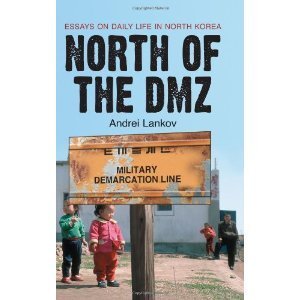 North of the DMZ: Essays on Daily Life in North Korea by Andrei Lankov
North of the DMZ: Essays on Daily Life in North Korea by Andrei Lankov
This was the last one I read, but the one I was least involved in. It's not that it wasn't informative. Lankov goes in-depth on exactly what he claims to: daily life in North Korea.
Everything about the book relates to the humdrum activities in North Korea: transportation, relationships, etiquette under the watchful eye of Kim Jong Il, life as people live it when they are starving and closed off from the rest of the world. There is pretty much everything here to describe exactly how North Korea's citizenry works, how it plays (not much) and how it keeps itself running. Lankov is a citizen of the former Soviet Union and thus was given a unique insight into the nation's workings, comparing them to other Stalinist regimes and predicting its downfall.
It's outstandingly informative…about everything except the people. It wasn't Lankov's fault, of course, for having been read after the other two books in my kick, but I was sort of hoping for more of a personal edge instead of the glut of impersonal information about structure and society than I got. I got those, after all, in the other two books with the added bonus of people I could relate to and get involved in.
Beyond that, though, a common issue I found in books about the nation was that it has changed a lot (for the worse) in the last twenty years. So while Lankov was commenting on a quirky, oppressive society that he predicted would end soon, the reality of the situation is something far worse and more horrifying.
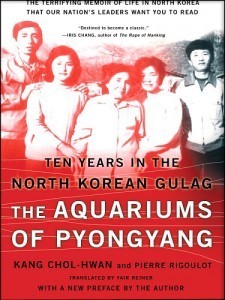 The Aquariums of Pyongyang by Kang Chol-Hwan and Pierre Rigoulot
The Aquariums of Pyongyang by Kang Chol-Hwan and Pierre Rigoulot
The Aquariums of Pyongyang is an amazingly heartbreaking and interesting story about the people of North Korea and how they were betrayed by their own government. Following the author's life, from the moment his Korean-born Japanese-emigrated left-wing grandmother convinced the family to go to the North to the moment his family was found guilty of trumped-up anti-nationalist crimes to the moment he was imprisoned in a labor camp to the moment he was let out and escaped to the South, it's basically a series of events illustrating the horrifying conditions in the nation's network of "secret" labor camps.
And it is horrifying, friends. To his credit, the author is emotionally involved without being grotesque or his views being compromised. I was concerned, slightly, about the book's academic integrity when I read the foreword that looked heavily into the author's religious views, but he treats the subject with as much of an unbiased look as he can…you know, having been unfairly convicted and sentenced to subhuman and inhumane conditions.
It's an incredible look into something a lot of us suspected the world left behind after WWII and the conditions and acts that go on will probably likely shock a lot of readers. As I said, though, it's not at all gratuitous and the aim is not to disgust or offend but to inform. It's definitely worth looking into if you've ever been at all curious as to what goes on behind the scenes.
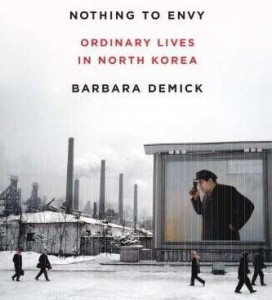 Nothing to Envy: Ordinary Lives in North Korea by Barbara Demick
Nothing to Envy: Ordinary Lives in North Korea by Barbara Demick
This was the first book I read in my kick and, as it turns out, the best. Demick, a journalist in South Korea, spent years collecting stories from six defectors from the regime to North Korea. Their walks of life couldn't be any more different: a privileged man from a good family background destined to rise in the regime's power, a doctor betrayed by her own nation, a mother who believed wholly and unabashedly in the regime's righteousness and her daughter who couldn't disagree more, a troublemaker and vagabond who grew up without father or future in the regime and a young girl from a disgraced family background destined for the worst the nation could have offered.
There's an immense amount to praise in this book: the fact that it's told from the stories and perspectives of these people who grew up within a regime lends it a startlingly emotional element while, at the same time, it refuses to pull any punches and coddle the reader. It follows the defectors from birth to present day, including the shockingly difficult transition into South Korean society that grips until the very end of the book and leaves you hoping that these people find their way. And beyond that, it goes into the stranger parts of the country: how a society claiming to espouse the Communist ideals of egalitarianism still very much supports and encourages the idea of familial background and status being integral to a person, the bizarre forms of dating and romance etiquette, the systems designed to encourage neighbor to despise neighbor and family to distrust family.
But what makes this book really the best out of the three is the fact that it's so recent. Demick's defectors were around from the time when the North enjoyed relative prosperity after being propped up by the USSR and China to the time when food was so scarce that people had to eat tree bark to survive. This gives a distinct arc to the book that lets us follow the decline of the nation and how it affects the defectors' lives and each defectors' pivotal moment when they realize there is a world beyond their own is incredibly moving.
I can't recommend this book enough, whether you're at all interested in the subject or not. If you are, it's informative, detailed and authentically insightful. If you're not, it's an incredible story about people living in lies and discovering an entirely different world. I don't mean that in a romantic comedy way, either, where some privileged white chick discovers Italian food or some stupid shit. This book will freak you the fuck out.
January 18, 2011
Mel Gibson Apologizes to the Elvish Community
At the risk of seeming prone to nepotism, Porno Kitsch is quickly becoming one of my favorite people to talk to on Twitter (the best of you better amp up your game a little). Specifically, their insight on fantasy tropes is providing some excellent discussions, such as when we chatted about the use of racial analogues in fantasy as evidenced in their review of Brandon Sanderson's The Way of Kings.
Today, we're going to talk about fantasy races and we are briefly going to touch upon race in fantasy. Mind, I'm more concerned with the former than the latter, but there is a nigh-inexhaustible source of insight on the latter subject in the form of N.K. Jemisin. An avid fan of her discussions, I highly recommend checking her out.
So, anyway, I hear that J.R.R. Tolkien once severely regretted not making the races more ambiguous and complex in The Lord of the Rings. Probably wise of him, since his portrayal of elves, orcs, men and dwarves is generally held up as fodder for criticism of racial portrayals in fantasy. It's true that a lot of readers are demanding our fantasy races to be a little more involved these days. We dislike orcs that are out and out evil, we dislike elves that are perfect and benevolent.
The reason for this, of course, comes back to the heart of a story: conflict and how to invest our readers in it.
Clearly-painted races remove us from this. If the orcs are evil and the elves are good, then…there isn't really a conflict, is there? We don't know why the orcs are doing what they're doing or why the elves feel compelled to stop them. And without motive, we don't really have a keen insight into the conflict and we're less invested in it.
Beyond that, it's just not realistic to portray a fantasy race that wants to kill everyone just for the sake of killing them. There has to be a logic (not necessarily logic, as it doesn't have to make sense to us) that drives the motive. Do the orcs need the elves' land? Do the orcs want to avenge themselves? Do the orcs view the elves as a threat to their way of life?
With the right logic, you certainly can have races with a clear moral distinction, but I tend to dislike them, as they tend to make the answers to them a little too obvious and thus they're not as explorable as a people with a little more complexity.
Really, though, this is kind of just regurgitating things that are largely known. Where the real meat of the discussion comes from is the idea of using clear racial analogues in fantasy.
It's become a bit more common lately: a race in a fantasy world that's a bit too close to a race we already know in our daily lives, following their culture, using their traditions, portraying their world. There may be different names, but we often end up with something resembling…
In the eras following the Great Warring States, we find that Bliro, a proud Blapanese man from Blapan and heir to the ancient Blirobito Blynasty is experiencing troubles with the distant land of Blina and the Blinese.
The above is something of a rather gross exaggeration, but it's also a pretty good indicator of why I dislike this sort of fantasy race-crafting.
I've heard arguments that the use of cultural analogues is a more genuine way of stating something in a book than inventing an entirely new one. After all, presumably all books say something about society, whether we intend for them to or not. And, indeed, having the cultures more relatable through clear analogues might be a better way of exploring them.
But the difficulty is, you often see these analogues used in conjunction with the former issue: a lack of moral ambiguity. And that's kind of the issue: when the cultural analogue isn't explored fully and just portrayed as they are seen through the eyes of another race (frequently, their enemy), it can come off as grievously offensive.
I'm definitely not accusing anyone of putting a distinct racist agenda in their work. But it's something that I feel is worth discussing and it's something I don't agree with.
But, as I've said, I've heard of authors who use it to great effect and authors who use it whose work is greatly praised. I certainly liked The Way of Kings, anyway. Maybe I'm just entirely full of shit.
What do you think?
January 11, 2011
To the Socratesmobile!
I should warn you, things are about to get a little meta here.
The Cape sucks. This is inarguable fact. If you liked it, you are a categorically bad person and I will bury you in six different countries (one of them will be Norway).
I just watched this and this idea just hit me so I won't waste a lot of time poetically leading up to the why it sucks (unless you count this sentence…and this one…and this one…and–you know, let's just do it.)
PHILOSOPHY.
Characters are defined by past and motive. With heroes and villains, though, they require something a tad different than motive. Motive is what guides a character from event to event, what shapes his reactions to other characters and what happens to him. Philosophy is what guides a hero or villain through his life, what shapes his reactions to himself and to his actions. That might sound a tad vague, but let's compare (briefly) the philosophies of THE CAPE.
In THE CAPE, the main character is a cop. A cop who loves his family dearly. A cop who is faithful and true to his duty. A cop who sleeps in his son's bed when his son has a nightmare. A cop who releases his anger by hitting a heavybag. This cop is done wrong by a maniacal villain. The villain takes over the city with his private army of policemen and banks! The villain is the face of a shadowy corporation! The villain wants nothing more than total power and control! The villain is above no means to get what he wants! Also, he's British, like all villains…ever.
Does this sound familiar? Well, probably, because it's pretty well-worn. Hero wants to maintain status quo, villain wants status quo shifted in his favor. Either way, not a lot is changing, is there? The city doesn't really suffer under the villain and we can see he actually runs it pretty efficiently. We're just told to believe he's evil because he's cackling and he's British. There's no real conflict in it for us, so not a tremendous amount of stake.
The philosophies don't really work, do they?
So let's look at something that does.
Batman's stories are, essentially, philosophical debates. Nearly all his villains represent an ideology or philosophical point of view and none of them is more recognizable than the Joker. He's gone through several iterations (several of which will undoubtedly be examples countering what I'm saying here, but that's the nature of comics), but there's been a few points that have remained largely the same about the Joker: he doesn't really want power, he doesn't really want money, he wants to prove a point.
That all machines, institutions and constructs of society are illusions, fragile things that can break and frequently do under pressure (usually applied by him). Thus, the world is as crazy as he is, pretending it's something it isn't. He's in on the joke. It's everyone else that needs it explained to them, so he does. Batman's viewpoint is that these are things that are real, that they have to be maintained and respected, even if they don't always make sense (hence why he does it himself rather than entrust it to police).
Every fight, every scheme foiled, every plot is a debate, point-counterpoint.
This is what makes a hero satisfying: his consideration of his own point of view against others. This is what makes villains three-dimensional: their desire to see things done a certain way for the reason they think are right. This is what makes a conflict interesting: the fact that you, the reader, can invest in a point of view and decide for yourself who is right.
But Sam!
Look, I was just about to wrap this up, so–
Aren't your characters lacking philosophy themselves? Are they not in it purely for survival? Is that not more instinct than philosophy?
Hm, you raise a good point, voice in my head.
I would justify my own characters by saying that "I'm not sure" is a valid philosophical point. Many philosophical inquiries end in it and a character can experience the same. A character can be a philosophy-in-progress, an argument unto themselves. You see this frequently, in fact, from some of the most intriguing characters who are frequently pitted against themselves. Sometimes, seeing the philosophy being created is as interesting as seeing the philosophy in action against someone else.
It occurs to me that this might be a tad heavy, perhaps something that will take a lot more thought on all our parts before we can apply it to our own writing.
But, whatever. We've got time.
Those of us not on deadlines, anyway.
Sam Sykes's Blog
- Sam Sykes's profile
- 1214 followers


